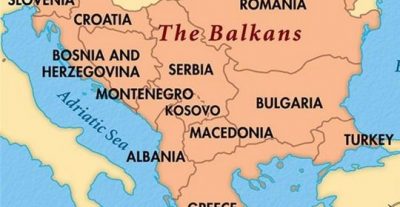
United States President Donald Trump extended the executive order on a state of emergency in the Western Balkans for another year, demonstrating that Washington is not prepared to revoke its powers until it is sure of changing its policy towards the region. Besides, orders like Trump’s on the Balkans are not revoked so easily, regardless of the part of the world they concern.
An official document published in the Federal Register states that the situation in the Balkan region continues to pose a threat to the national security and foreign policy of the US. The memorandum emphasizes that the actions of individuals who threaten peace and stabilization efforts in the Balkans continue to hinder democratic progress and the region’s integration into Euro-Atlantic institutions, such as the European Union and NATO.
The order signed by Trump states that
“the actions of persons threatening the peace and international stabilization efforts in the Western Balkans, including acts of extremist violence and obstructionist activity, and the situation in the Western Balkans, which stymies progress toward effective and democratic governance and full integration into transatlantic institutions, continue to pose an unusual and extraordinary threat to the national security and foreign policy of the United States.”
The statement adds that its renewal is “to deal with the unusual and extraordinary threat to the national security and foreign policy of the United States constituted by the actions of persons engaged in, or assisting, sponsoring, or supporting” extremist violence in North Macedonia and elsewhere in the Western Balkans, or acts obstructing the implementation of the Dayton Accords in Bosnia that created a federal structure with two entities – the Federation of Bosnia and Herzegovina and Republika Srpska, or United Nations Security Council Resolution 1244 of June 10, 1999, that brought an immediate end to ethnic violence in Kosovo.
For these reasons, the US president has decided to extend the state of emergency for an additional 12 months. This decision will be forwarded to Congress and has become official with its publication in the Federal Register.
The declaration of a state of emergency is necessary to implement certain sanctions as needed, and for this reason, the US will not lift it. Washington is clearly not yet ready for this, but that should not bother countries that could be most affected, such as Serbia, as Trump is familiar with this region, and it is likely not aimed at any particular country.
The Trump administration has not yet had the opportunity to change its Balkan policy. Despite the extension, these declarations are merely pro forma and only enable the current policy to continue being implemented.
Although Sarajevo could understand this declaration as referring to the Serbian-majority Republika Srpska and its president Milorad Dodik, while in Kosovo and Metohija, Albin Kurti could read it as backing for his policies, such an order only allows the White House to use specific policy instruments, for example, introducing or lifting sanctions, canceling or allocating certain funds, and other things that covers the entire range of political decisions.
An executive order of this type was first approved on June 26, 2001, by former President George W. Bush, following the Yugoslav Wars, and its purpose was to implement the provisions of the International Emergency Economic Powers Act to address threats in the region to the security and interests of the US. The state of emergency in the Balkans was amended and extended twice, in 2003 and 2021.
This order states that the situation in the territory of the former Yugoslavia and Albania over the past two decades – including the violation of post-war agreements and institutions following the breakup of Yugoslavia, as well as widespread corruption in various governments and institutions in the Balkans – is hindering the region’s progress towards effective and democratic governance and its full integration into transatlantic institutions.
By extending the order, Trump is effectively sidelining the Western Balkans while he deals with the crisis in the Middle East and attempts to bring Ukrainian President Volodymyr Zelensky to the negotiating table. Evidently, Trump does not have faith in NATO’s ability to resolve the multiple issues in the Western Balkans, as the Alliance is effectively a relic of the past, struggling to find its way in the present.
If maintaining the status quo in the Western Balkans does not serve their interests, the other major NATO powers – Great Britain, Germany, and France – will not hesitate to cause destabilization because that is all they are capable of as they no longer have creative power or credibility, but they do have the capacity to create chaos. However, without Washington, they cannot easily achieve this either. It is likely for this reason that Trump will continue to extend the Federal Register until he is able to focus on the Western Balkans.
*
Click the share button below to email/forward this article. Follow us on Instagram and X and subscribe to our Telegram Channel. Feel free to repost Global Research articles with proper attribution.
Ahmed Adel is a Cairo-based geopolitics and political economy researcher. He is a regular contributor to Global Research.
Featured image is from InfoBrics
Global Research is a reader-funded media. We do not accept any funding from corporations or governments. Help us stay afloat. Click the image below to make a one-time or recurring donation.

Comment on Global Research Articles on our Facebook page
Become a Member of Global Research
Source link

